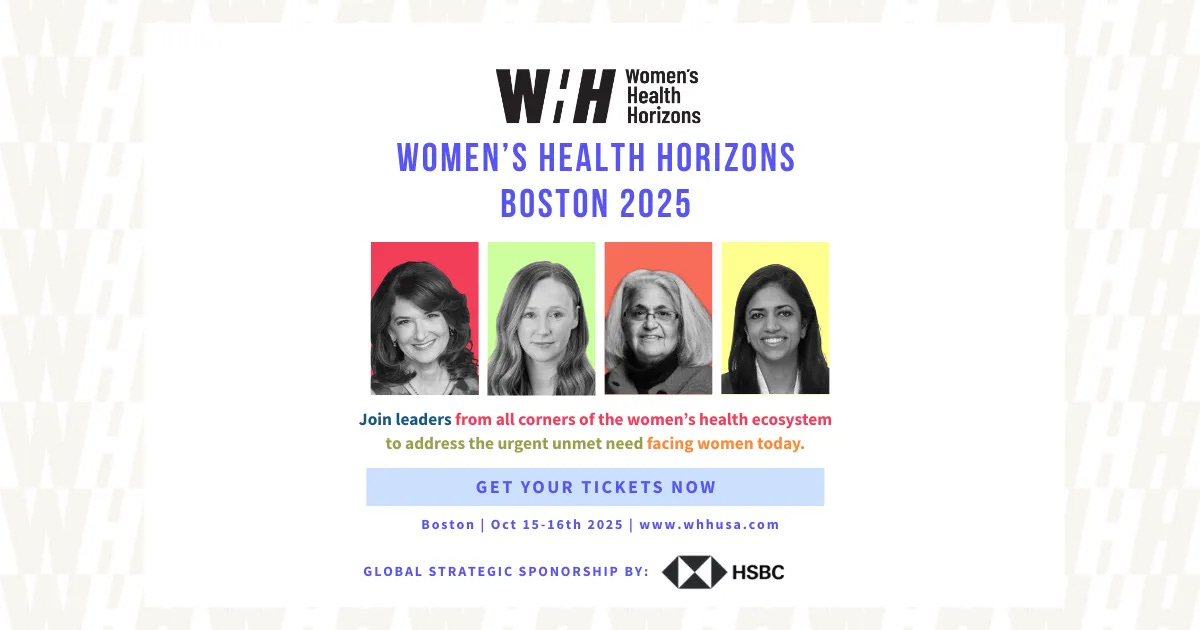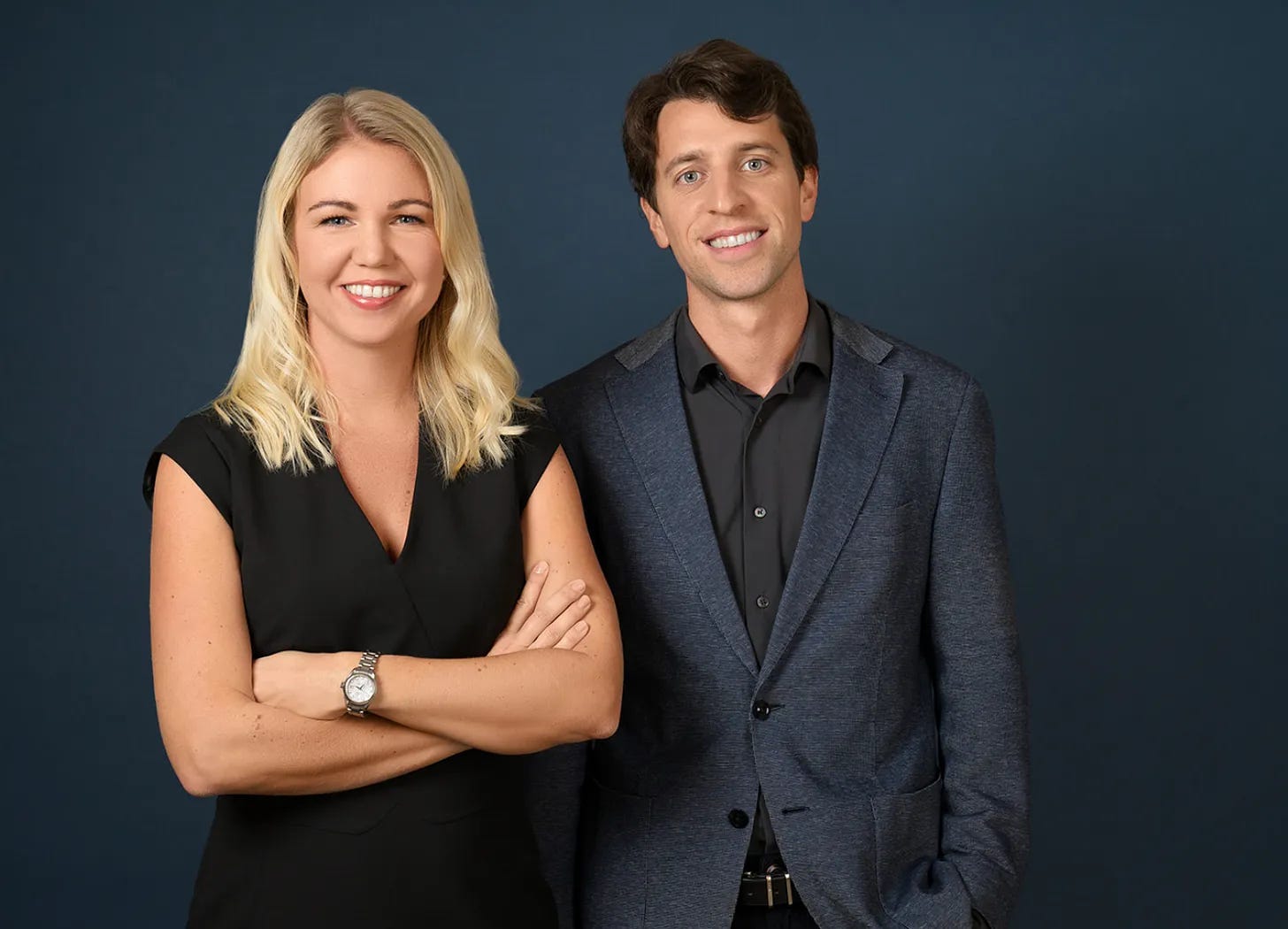💌 Issue 117: Midi Health's Series C | Natural Cycles launches perimenopause mode | Peloton x Respin partnership | European Femtech map
The global weekly briefing on women's health innovation and FemTech
Welcome to FutureFemHealth, (w/c October 6 2025) — trusted by 8,600 investors, innovators and leaders to decode the funding flows, breakthrough ideas and policy shifts transforming the sector.
October’s shaping up to be a big month for women’s health events - with the inaugural Women’s Health Horizons conference in Boston (more on that below) and Portfolia’s women’s health Fall Summit in New York. As for me, I’ll be attending Women’s Health Week Europe in London and Nexus’ fully-booked panel on ‘Breaking the bias.’ See you there?
🌟 In this week’s briefing:
🏆 Midi Health breaks through to a $50m Series C
🚲 Fitness meets menopause as Peloton partners with Respin
📈 Natural Cycles eyes 50% growth as it gears up for perimenopause mode launch.
🌍 New European femtech map
Got news to share from the world of FemTech and women’s health innovation? Let me know at anna@futurefemhealth.com
🚲 Fitness meets menopause
The fitness industry has a lot to prove to midlife women.
We’re a generation raised on the diet culture of the 80s and 90s who learned to see exercise as punishment. It was a tool to lose weight and that was it.
But that’s changing fast.
Midlife women are now some of the most active demographic groups in fitness. They are training for strength, longevity and health rather than aesthetics.
Now they need the fitness industry to catch up and design around them.
This week, fitness giant Peloton announced a new partnership with Halle Berry’s menopause care platform, Respin Health, to explore how targeted exercise can improve menopause symptoms. (Read our full story here)
I love the approach - they’re beginning with a large-scale research study exploring how exercise affects menopause symptoms.
The PRESS Study (Peloton/Respin Exercise & Symptoms Study) will see 500 members take part in an eight-week program designed with menopause in mind - sleep, mood, energy, the works.
And the results, due early next year, will shape the new Peloton x Respin Menopause Care Program - the company’s first dedicated content for menopausal women.
According to Peloton, data will be collected on symptom change and adherence, with guidance from Respin’s clinical advisors - a small but important sign that this is more than marketing research.
And, the collaboration also lands during World Menopause Awareness Month, whose 2025 theme is, coincidentally, “Lifestyle as Medicine.”
Midlife women are training for health
Today’s midlife women have unlearned and relearned what an active lifestyle is really about. But now they need exercise to really deliver on its ‘health promise.’
Wearables and apps give them data and insights, but after the fact. What they lack are purpose-built programmes - backed by evidence - that help them sleep better, stay strong, stay mobile and protect long-term health.
That’s what’s interesting to me about the Peloton-Respin partnership. It’s fitness seeking scientific legitimacy and an effort to actually quantify how exercise can impact symptoms in the real world.
A new context
The backdrop is changing fast. Perimenopausal women are fueling the GLP-1 boom. Midlife platforms like Midi Health and WeightWatchers (newly-focused on the menopause market) offer GLP-1 medications alongside HRT and coaching.
It’s easy to see why. For many women in midlife, fitness doesn’t feel personalized to them anymore - hormones, metabolism, and time can often make it feel like a losing battle.
When it comes to weight loss, GLP-1s offer something the fitness industry rarely has: certainty.
While exercise has always been an evidence-driven foundation of women’s health. The opportunity now is to really tailor it for midlife health and to prove that it can work for symptoms alongside fluctuating hormones.
Looking ahead
As menopause continues to be big business, menowashing will be easy - packaging up midlife fitness as medicine without the science to match.
If fitness is to take its place in personalized midlife women’s health, it will need to show its work: open data, measurable outcomes, credible research partners.
That’s the real test for “lifestyle as medicine.”
And the truth is, we don’t yet know how Peloton’s menopause launch will play out - or how deep the research is beneath the marketing.
But, that’s exactly the point. In women’s health proof will always outlast the hype.
📍Join WHH live in Boston at the Hyatt Regency Boston/Cambridge
🎤 Oct. 15-16, 2025
Led by industry pioneers and focused on action, WHH brings together all corners of the ecosystem: from FemTech founders, VCs, policymakers, and patient perspectives, to payers, providers, life science leaders, and advocacy experts. Expect over 50 speakers and nearly 300 attendees in Boston for their inaugural event next week.
💰 Capital flows: where are investors placing bets?
📌 U.S: Midi Health raises $50m, betting on longevity and AI for women’s midlife care. Only a handful of women’s health startups - think Flo Health or Diana Health - have reached Series C in recent years. For a midlife-focused company to do so is even rarer. Midi’s model, which combines insurance-covered telehealth with clinical menopause and longevity care, is now serving 20,000 patients weekly (and that’s doubled since the start of this year alone!) and is reporting “91% symptom improvement within two months,” according to lead investor Advance Venture Partners. Midi Health has now closed a $50m Series C (bringing total funding since 2021 to $150M), reports Business Insider. With this latest round, expect to see Midi doubling down on AI-driven, insurance-backed longevity care. (Continue reading: Business Insider (paywall) or read this blog post from lead investor AVP)
🌟 Industry moves and strategic shifts
📌 SWEDEN: Natural Cycles eyes 50% growth and gears up for perimenopause mode launch. Reproductive health is maturing - and perimenopause is the natural next step. Some 12 years after launching the first digital contraceptive app, Natural Cycles projects 50% sales growth for 2025 and later this month will roll out a perimenopause mode. With earlier moves into postpartum support, Natural Cycles is proving it can offer full-spectrum hormonal care — keeping users engaged through to the end of their reproductive years.(Continue reading: FutureFemHealth)
📌 AFRICA: Butterfly Network’s AI tool brings faster, easier pregnancy scans to Sub-Saharan Africa. Many maternal deaths in Sub-Saharan Africa are preventable - but limited access to ultrasound makes early care difficult. Butterfly Network’s new AI tool helps midwives in Malawi and Uganda estimate how far along a pregnancy is - no ultrasound training required. Developed with the University of North Carolina and Gates Foundation support, the model was trained on African data for local accuracy. Early results from Butterfly’s wider ultrasound rollout in Kenya and South Africa show higher antenatal attendance and drops in stillbirths and maternal deaths. (Continue reading: FutureFemHealth)
📌 UK/U.S: Plexāā launches BLOOM⁴³, a wearable and app to prep patients for breast surgery. Plexāā’s device gently heats tissue before operations to boost blood flow and reduce complications - early data show a 24% drop in skin necrosis and 50% fewer follow-up surgeries. After securing $4.5million in July, the UK medtech is now launching in the U.S., pairing its wearable with a companion app that guides patients through personalized pre-surgery routines and recovery prep. It also tackles an ongoing gap: most patients feel physically and mentally unready for breast procedures. (Continue reading: HIT Consultant)
📌 EUROPE: New Femtech map. 13 countries, 10 verticals and 273 companies - the new European Femtech map is now online, created by Femtech Italy together with the European communities of Femtech Across Borders. Notably - France, Germany and the UK lead with the number of companies, while Denmark, Italy and Switzerland are growing the fastest. (Continue reading: FemTech Italy on LinkedIn)
📌 UK: Ocado and Asda roll out dedicated menopause aisles with GenM. ‘Menopause-friendly’ toothpaste and deodorant are just two of the many products that customers can now discover more easily at supermarket giants Ocado and Asda. The retailers are the latest to partner with GenM to spotlight trusted products in store - another sign that menopause is moving more mainstream and from medical to retail. (Continue reading: The Grocer)
This week’s poll
Last week’s poll asked ‘is there too much emphasis on ‘bikini medicine in women’s health’? A resounding 82% of you said ‘yes’!
👩🏽💻 Do you have a juicy question we could ask our readers? Let me know at anna@futurefemhealth.com!
📄 Policy watch: risks and opportunities
📌 U.S: Government shuts down, women’s health research pays the price. The U.S government has entered a shutdown (effective October 1) after Congress failed to approve spending for FY26. Federally funded scientific work, including women’s health research is among the hardest hit. Clinical trials are delayed, grants are frozen, staff are furloughed and long-term projects risk losing momentum. For a field like women’s health where we are are already so behind and underfunded these interruptions unwind progress. The Society for Women’s Health Research (SWHR) is now urging Congress to restore funding quickly, warning that the impact will ripple from labs and universities all the way to women awaiting new treatments. (Continue reading: SWHR)
📌 EUROPE: European Commission to consider fund for EU-wide access to abortion. An estimated 20 million women in Europe lack access to appropriate abortion services, according to the EU-wide My Voice, My Choice activist movement. The European Commission will now study a proposal to create a fund to help women access safe abortions when they cannot do so in their own countries due to restrictive laws, following a citizens’ campaign that gathered one million signatures across the EU. The Commission is expected to give campaigners an official reply by March 2026, outlining the actions it intends to take, if any. (Continue reading: Euro News)
📌 GLOBAL: Why promising women’s health companies die so often. Even the best ideas in women’s health keep hitting the same walls - there’s reimbursement gaps, regulatory burden, cultural stigma, and the list goes on. Health tech executive Veronica Adamson calls for a rethink on funding, regulation and adoption pathways so that we can finally see real progress. (Continue reading: Stat News)
✅ Hiring now
📌 U.S: Director, Women’s Health Partnerships, Oura
📌 UK: Senior Product Manager, Pregnancy+, Philips
That’s all for this week! If you’ve missed any previous newsletter issues catch them all at futurefemhealth.com and do make sure to follow us on LinkedIn.
Anna
PS. FutureFemHealth now reaches 8,500 decision-makers and professionals in women’s health each week - from investors and founders to healthcare leaders and corporates. To explore partnership opportunities or request our media pack contact: anna@futurefemhealth.com






